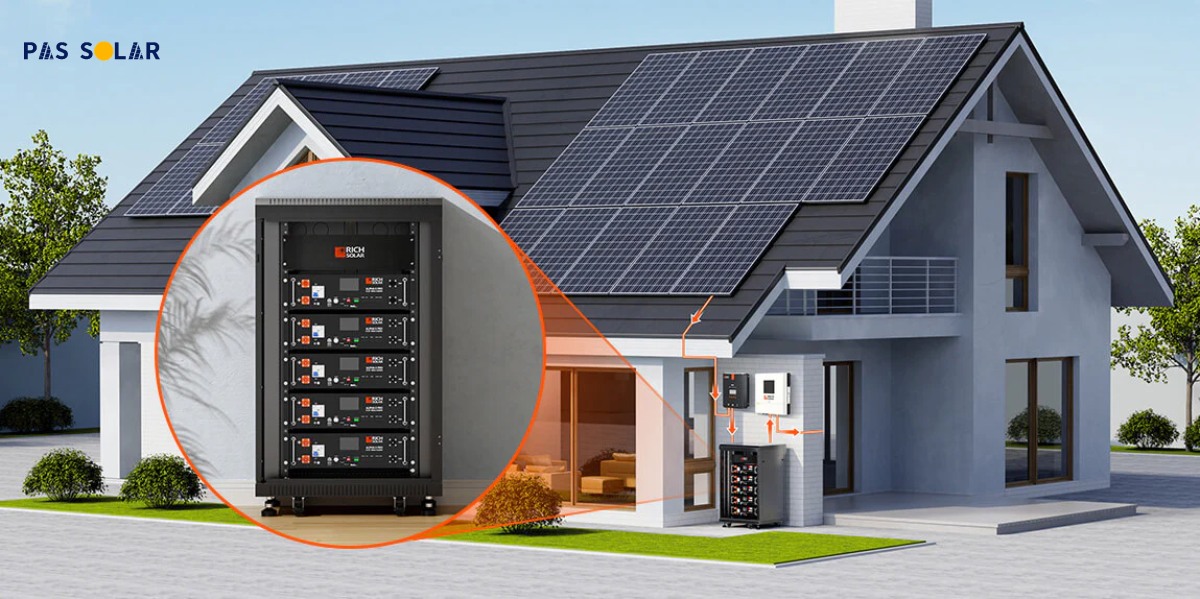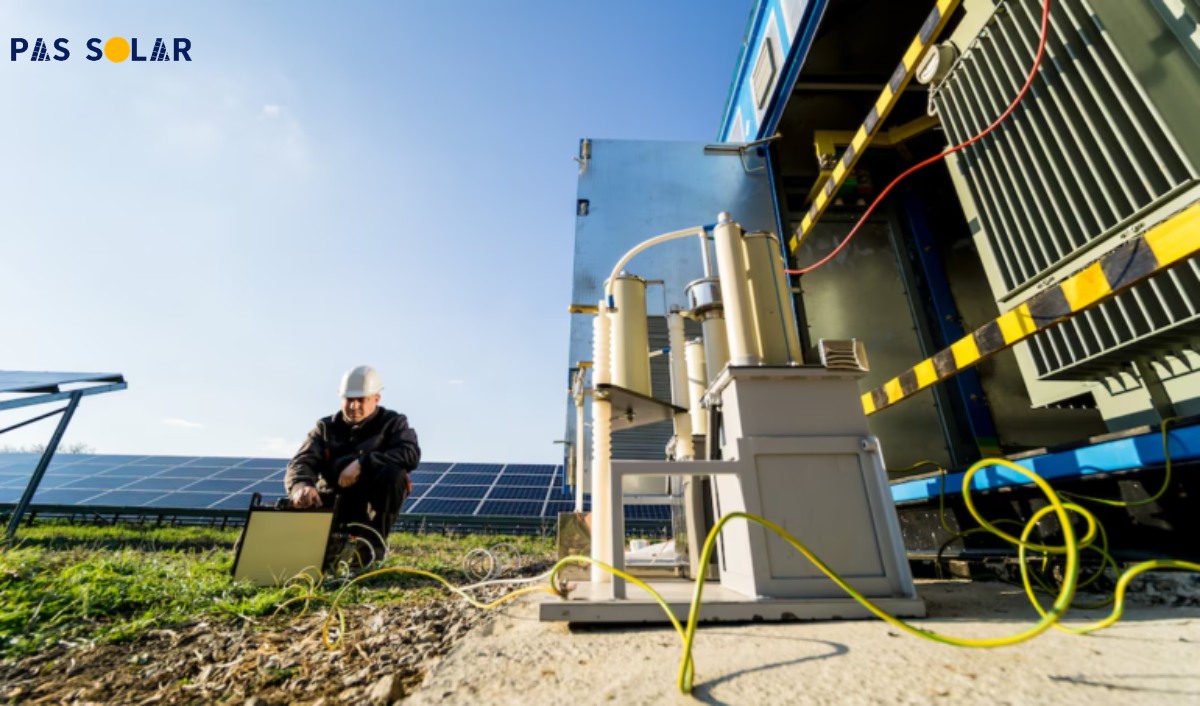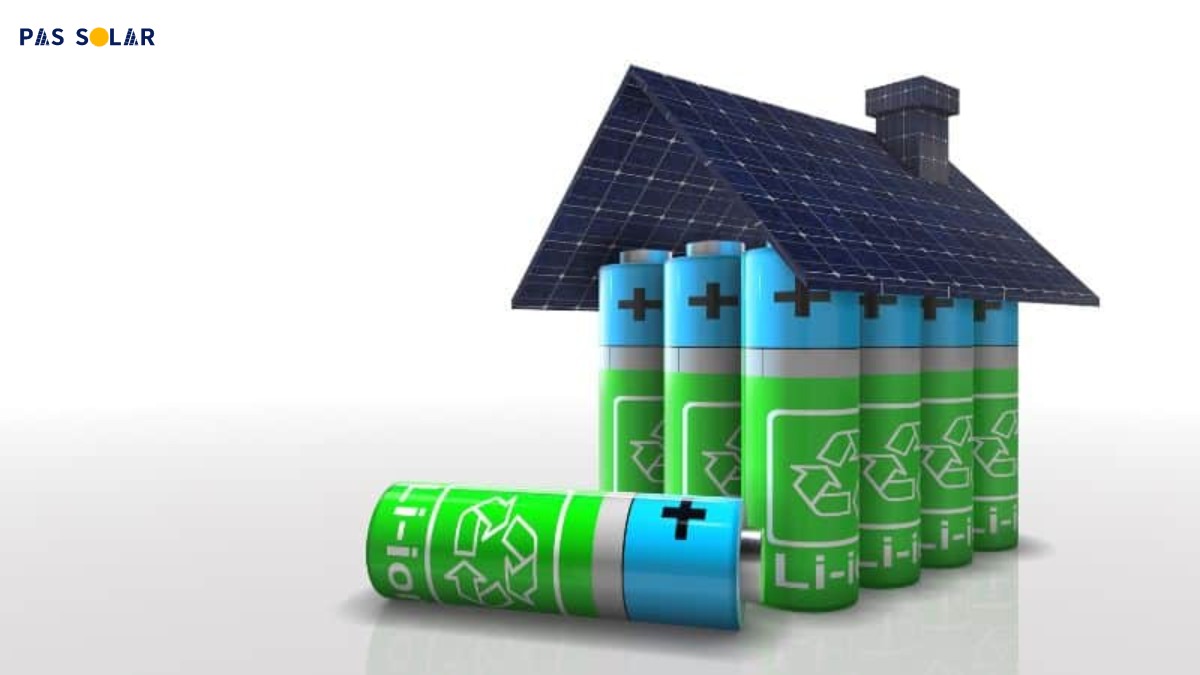

Maintaining Solar Lithium Batteries is not a complicated action. Some small and smart habits can keep your system running strong for long years and have reliable performance and lower cost for ownership. One common question usually asked from customers is: How Long Do Solar Lithium Batteries Really Last? The answer depends on correct deep cycle lithium battery practices, proper maintenance, chemistry, and operating conditions.
Each step from choosing the right installation region to way of charging wisely are important. This guide is written for professional businessmen at Pas Solar, who manage large solar projects all over Iran, Iraq, the UAE, and Syria. This helps you to protect their batteries’ lifespan simply and get the best l results during the time.
Lithium solar battery systems are at the heart of modern solar projects. They deliver dependable energy storage, backup power and extra value for your Solar Panel system. But the useful life depends on how carefully they’re maintained. Regular renewable energy battery maintenance helps you to protect your investment, cutting costly replacements, and keeping performance regular across all operating conditions.
Constant monitoring and conscious charging practices avoid overheating, overcharging, and unnecessary over exert on the cells. When charging and discharging are balanced, batteries meet both safety and stability. Beyond performance, this way of caring also can be an eco-friendly action by reducing environmental impact and the need for frequent replacements.

Following simple Solar Panel energy battery tips can help you to enjoy a longer battery lifespan, safer operation, and more dependable energy performance. A properly maintained LITHIUM SOLAR BATTERY delivers reliable energy day after day.
Install batteries in a controlled space with proper airflow and protection from direct sun, dust, and moisture. High temperatures speeds up capacity loss, so, place enclosures away from heat sources and use cooling systems in unventilated containers or rooftops without temperature control.
Installers should always place batteries in an indoor or shaded outdoor cabinet with good airflow to maintain safe operating heats. Avoid exposing cells to direct sunlight, as it can speed up wear and decrease performance. Make sure the setup lets easy access for routine inspections and temperature monitoring to ensure long term reliability.
is essential for safe and efficient operation. It protects the battery from overcharging, deep discharging, cell imbalance, and overheating—issues that can quickly reduce lifespan or cause system failure. During installation, check the BMS firmware, alarm settings, and its communication with the inverter to ensure everything operates smoothly and without issues. It should be checked annually.
Lithium-ion batteries do not perform well under extreme conditions.Don’t leave the batteries fully charged for long periods, and avoid draining them down to very low levels frequently. Keeping the battery charged within a moderate range (between 20% and 80%). Limiting how deeply the battery is discharged on daily cycles increases the total usable cycles. Be sure to set charge limits and float settings following the manufacturer’s guidelines.
Draining the battery too much or charging and discharging (C rates) too quickly puts stress on the cells and makes them lose capacity faster. For industrial systems where reliability is really important, keep DoD limits low for full time backup use, and just let higher discharges during emergencies. Design the system so that normal usage only draws a small portion of the battery’s total capacity.
Proper management of depth of discharge and C rate is so important for each deep cycle lithium battery, and regular solar battery maintenance helps prevent overheating, overcharging, and unnecessary wear, keeping your solar energy system efficient and durable
Temperature is the most important factor affecting battery life. Keep batteries within the normal range and provide heating for very cold regions or cooling for hot climate cities. Also, temperature monitoring and alerts for out-of-range conditions should be included in any agreement with installers or suppliers.
Create a checklist for on site technicians every month in order to deeper inspection. You should check visual condition, tight connections, signs of corrosion, ventilation performance, BMS alarms, and recorded temperature or voltage. Record all information in a central system so patterns can be seen early, helping to prevent potential failures.
If you need to store batteries before using them, keep them at around 40% charge in cool, ventilated place. Storing them at very low voltage for a long time can permanently damage the cells. When transporting, follow the manufacturer’s advice and don’t mix old and new cells in the same string.
Modern solar systems usually monitor remotely to detect gradual wear, rising internal resistance or cell imbalance. To avoid unexpected issues, keep the monitoring system and firmware up to date, but do this during maintenance periods and after backup tests. Make sure that the distributor provides update logs and change details.
Train your team to understand alarms and disconnect batteries safely when needed. Keep warranty documents and serial numbers due to replacements if required. It is necessary to check authenticity and warranty papers before buying. Purchasing from trusted distributors helps you to avoid buying fake cells that fail really soon. Offer optional service plans for customers who need remote monitoring and fast delivery.
Always work with a trusted Solar Lithium Battery distributor. For customers in the Middle East, whether in Iran, Dubai, or the UAE, choosing authentic Solar Lithium Battery in Dubai or Solar Lithium Battery in UAE ensures original products, certified warranties, and dependable service.

A regular maintenance plan ensures safety, optimal performance, and long battery lifespan.. The table below shows some important maintenance tasks, their frequency, and the importance of each one.
| Task | Frequency | Why it matters |
| Check Battery Condition and Tightness of Terminals | Monthly | Detect loose connections, corrosion, or leaks early |
| BMS health and firmware test | Every 3 months | Avoids unsafe operating windows and ensures protection |
| Temperature and ventilation check | Monthly with regular monitoring | Prevents accelerated ageing from heat |
| Capacity and performance check | Annually | Catch capacity fade and need for rebalance or service |
| Storage state for offline systems | Every 3 months | Avoids deep discharge during storage |
Maintaining Solar Lithium Batteries can’t stop and it is a continuous process. Following these solar energy battery tips and proper solar battery maintenance help you to have maximum performance from your Solar Lithium Battery. Partnering with a reputable Solar Lithium Battery distributor in Dubai or around the UAE guarantees peace of mind.
For choosing and maintaining the right solar lithium batteries you should consider proper chemistry, integrated BMS, safe installation, and regular preventive checks to increase the batteries lifespan, reliability, and performance. Whether for industrial projects, off-grid systems, or hot and humid locations, following renewable energy battery maintenance best practices to be sure about your investment that delivers long term and uninterrupted energy.
For getting the expert advice, accurate system sizing, and trusted suppliers, contact us at the Pas Solar now and secure your solar lithium battery system.
PAS SOLAR is a Distributer of solar equipment based in UAE. Composed of a team of professionals with the goal to provide customers with the latest Tier 1 Solar system in the region.
"*" indicates required fields